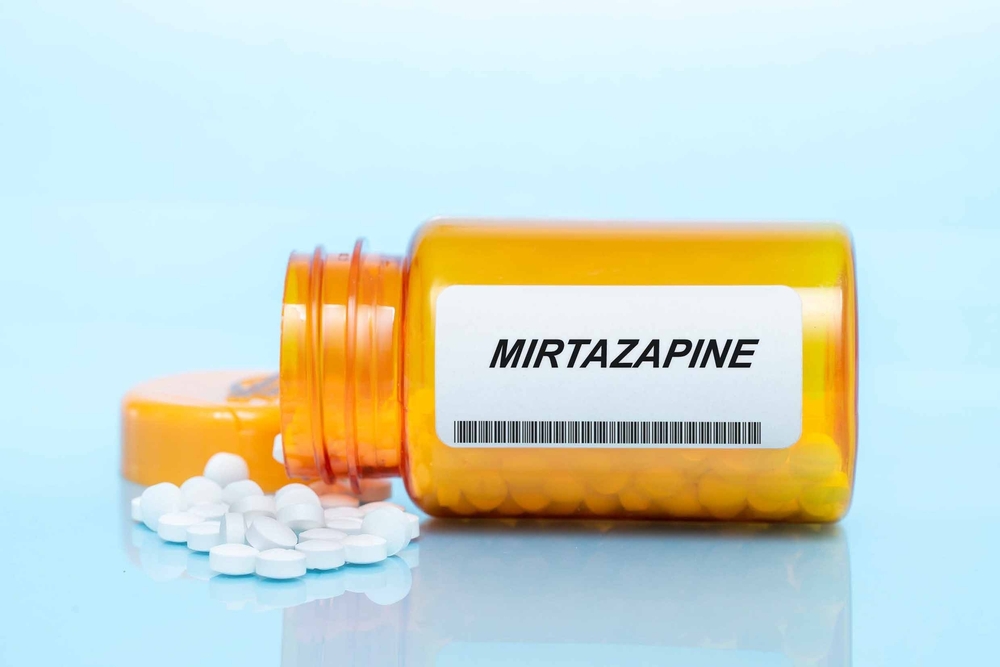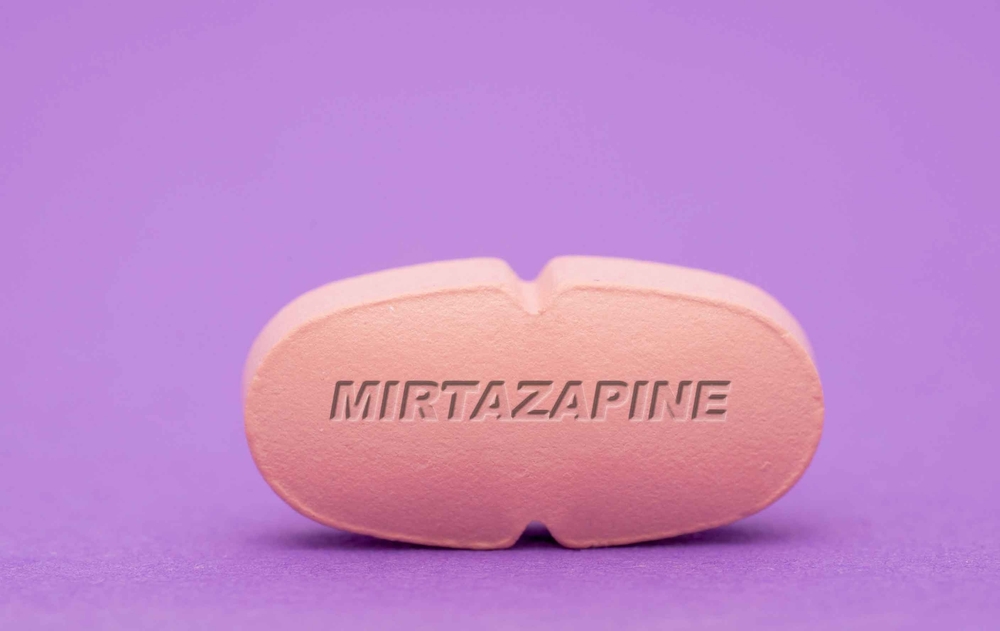Last Updated:
July 21st, 2025
Taking Mirtazapine as Part of the Detox Process
Depression and anxiety are common symptoms during alcohol and drug withdrawal, making an already difficult detox phase even more challenging. Mirtazapine detox medication can offer significant relief from these symptoms, helping you get through this critical initial period of recovery safely and more comfortably. Mirtazapine’s effectiveness has seen it become one of the most used medications in addiction treatment, and understanding how it works, the benefits and the potential risks are all crucial for its effective and safe use.

What is mirtazapine?
Mirtazapine, usually sold in Britain under the brand name Remeron, is an antidepressant that belongs to the noradrenergic and specific serotonergic antidepressant (NaSSA) class. Mirtazapine was first released in the 1990s for major depressive disorder, but since then, its use has been expanded to PTSD, panic and anxiety disorders and as a detox medication.
Mirtazapine comes in a range of pills and injections, including 15 mg, 30 mg and 45 mg. It is usually taken once a day, and the exact dosage differs between conditions, symptoms and individual responses to treatment.
How does Remeron work?
Remeron is often prescribed after other antidepressants don’t work due to its unique mechanism. It blocks particular serotonin receptors (5-HT2 and 5-HT3) along with alpha-2 adrenergic receptors, promoting norepinephrine and serotonin release. These are chemicals called neurotransmitters which affect your mood and emotions. Levels of these neurotransmitters are often low in people with conditions like anxiety and depression, and by raising them, Remeron can help alleviate the symptoms.
There are two secondary ways that Remeron helps with mental health conditions. First, Remeron’s action on your brain’s receptors increases histamine levels, creating a sedative effect. This can help with insomnia which is a common symptom of anxiety and depression.
Second, Remeron changes how your brain responds to triggers that bring on panic or stress. It does this by stimulating serotonergic and noradrenergic activity, which keeps you psychologically and emotionally stable and reduces the intensity and frequency of panic attacks and anxious episodes.
What are the potential side effects of mirtazapine?
While mirtazapine detox medication is very effective, it is a powerful drug that can produce adverse and even dangerous reactions. It is important that patients are aware of these risks and tell their doctors straight away if they notice any.
Common mirtazapine side effects
- Mirtazapine weight gain: Long-term mirtazapine use is frequently linked to significant weight gain and changes in metabolism, which can potentially escalate the risk for diabetes and cardiovascular issues.
- Drowsiness and sedation: These occur particularly at low doses due to mirtazapine’s antihistamine properties.
- Dry mouth
- Lightheadedness and dizziness
- Gastrointestinal problems
Rarer and potentially more serious side effects of mirtazapine
- Serotonin syndrome: This is a possibly fatal reaction that can develop when mirtazapine is combined with other drugs that enhance serotonin levels. Symptoms of serotonin syndrome include fever, accelerated heart rate, extreme agitation and confusion. If you notice any of these, seek urgent medical care.
- Behavioural and mood changes: A small number of people taking mirtazapine may notice a decline in their mood or erratic behaviours, including suicidal thoughts. Again, these symptoms can be very serious and require swift medical care.
- Sleep disturbances: Mirtazapine side effects can include a number of sleep issues, including intense nightmares, sleep paralysis, restless leg syndrome and instances of sleepwalking.
- Skin issues: On rare occasions, mirtazapine can induce severe skin reactions such as toxic epidermal necrolysis and Stevens-Johnson syndrome, both of which require emergency medical response.
- Liver harm: Mirtazapine is also linked to potential liver damage, which can range from mild enzyme increases to severe hepatitis. Those with existing liver issues should be particularly cautious, with regular liver function monitoring recommended.
- A drop in white blood cell levels: Mirtazapine may cause severe neutropenia, a critical drop in white blood cells that heightens infection risk. This serious side effect of mirtazapine requires stopping the medication immediately and getting prompt medical testing.

Our compassionate team are ready and available to take your call, and guide you towards lasting the lasting addiction recovery you deserve.
Is mirtazapine addictive?
While mirtazapine detox medication is not typically considered addictive, discontinuing its use suddenly can result in mirtazapine withdrawal. This can cause symptoms including agitation, dizziness and flu-like symptoms. To prevent mirtazapine withdrawal, your dosage should be tapered gradually under medical guidance.
Notable mirtazapine drug interactions
There are a number of drug interactions which can make mirtazapine less effective or even dangerous. Some of the most notable include:
Contact us today to learn more about mirtazapine and the detox process
Overcoming addiction is a tough journey, but with the right support, it’s entirely achievable. Connect with us at Addiction Helper to discuss how mirtazapine can aid your detox process and to explore rehab programmes that cover your needs. We are ready to assist you with expert advice, helping you embark on a path to successful recovery.
Our compassionate team are ready and available to take your call, and guide you towards lasting the lasting addiction recovery you deserve.
Frequently Asked Questions
(Click here to see works cited)
- Durbin, Kaci. “Mirtazapine Uses, Dosage & Side Effects.” Drugs.com, 23 August 2023, https://www.drugs.com/mirtazapine.html. Accessed 18 March 2025.
- Albuquerque, Nuno. “Mirtazapine | Mirtazapine for detox treatment | UKAT.” UK Addiction Treatment Centres, 8 August 2023, https://www.ukat.co.uk/detox/medication/mirtazapine/. Accessed 18 March 2025.
- NHS. “Mirtazapine.” NHS, https://www.nhs.uk/medicines/mirtazapine/. Accessed 18 March 2025.
- MedlinePlus. “Mirtazapine.” MedlinePlus, 15 January 2022, https://medlineplus.gov/druginfo/meds/a697009.html. Accessed 18 March 2025.
- Maidwell-Smith, Alice, and Charlotte Kirk. “Mirtazapine-induced neutropenic sepsis in an older person: a case report.” NCBI, 14 April 2023, https://www.ncbi.nlm.nih.gov/pmc/articles/PMC10103480/. Accessed 18 March 2025.

